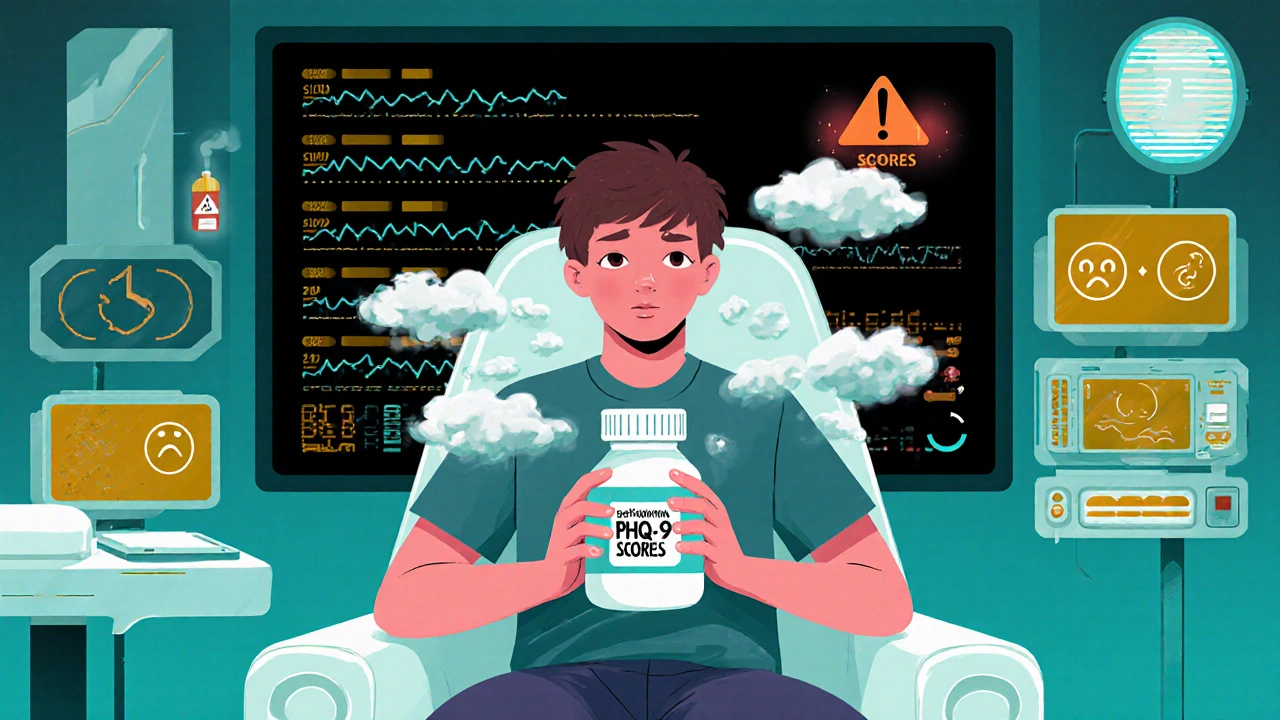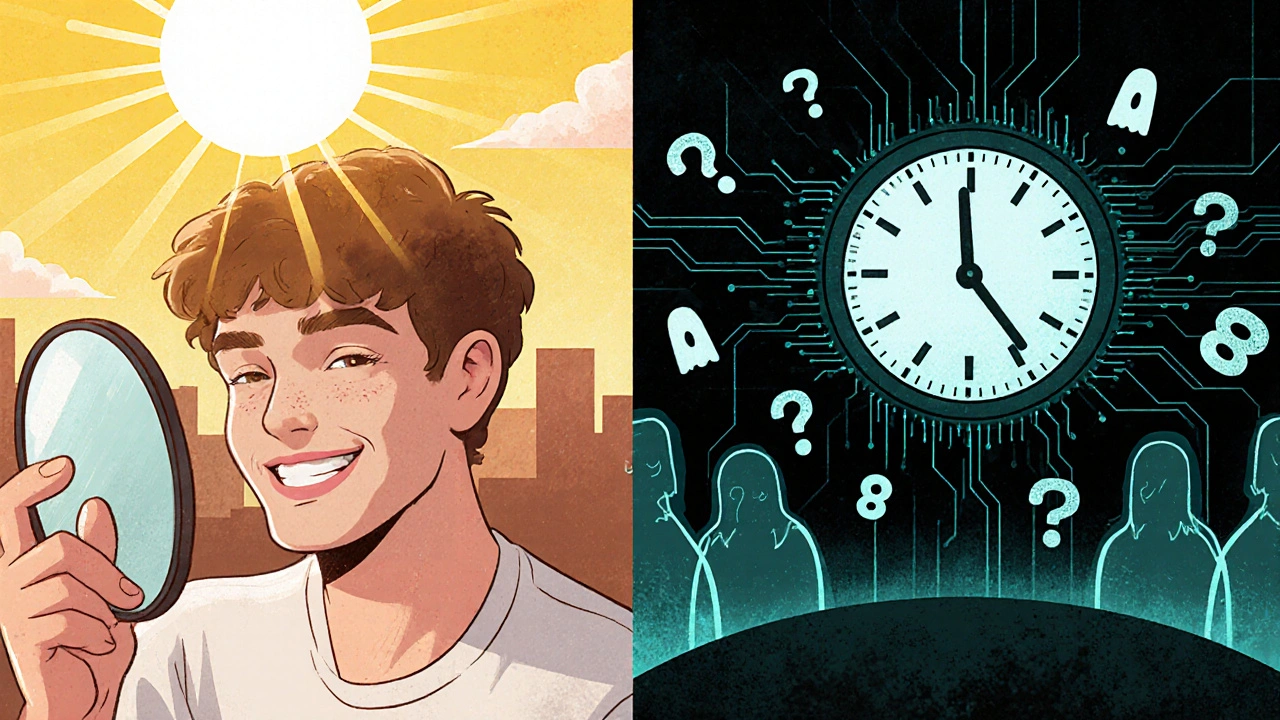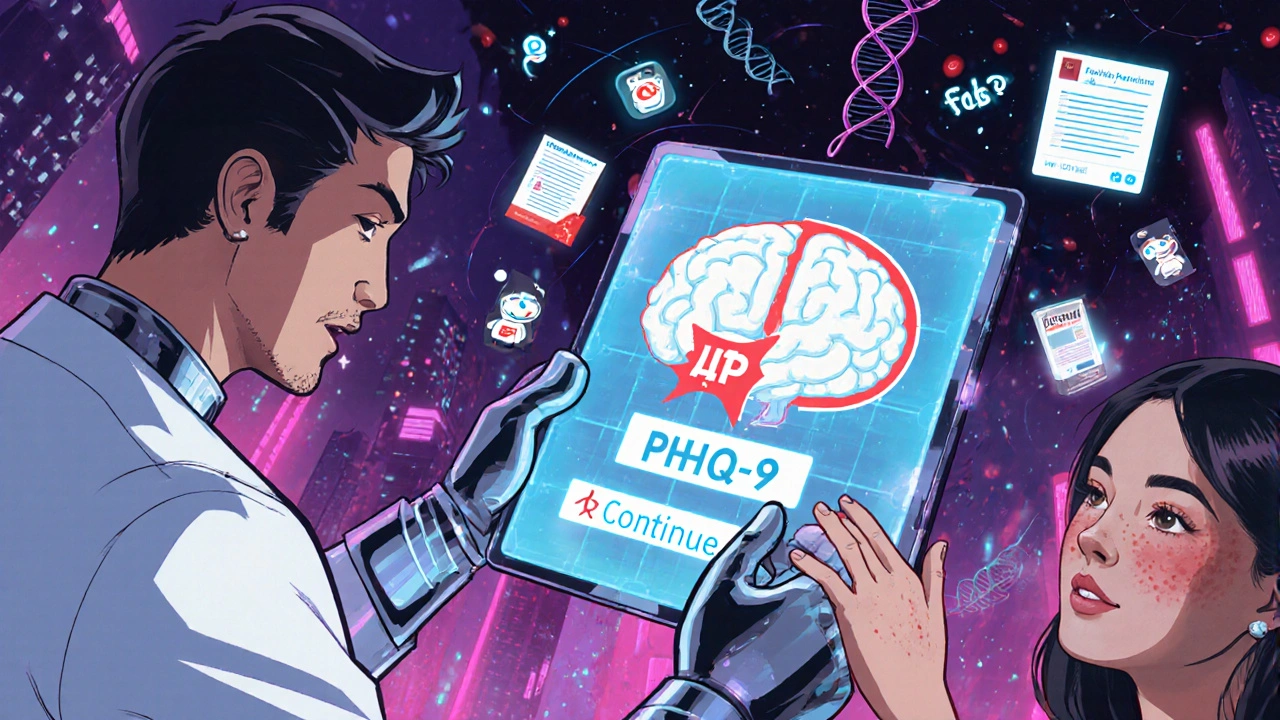Isotretinoin and Depression: What You Need to Know About Mental Health Monitoring
 Nov, 25 2025
Nov, 25 2025
Isotretinoin Mental Health Risk Checker
Risk Assessment Tool
This tool helps you understand your potential risk of mental health changes while taking isotretinoin based on your personal factors.
Isotretinoin is one of the most effective treatments for severe acne. For many people, it’s life-changing-clear skin, less scarring, improved confidence. But behind that success story is a quiet, often misunderstood risk: depression and other mental health changes. If you’re considering isotretinoin, or already on it, you need to know what’s real, what’s exaggerated, and how to protect your mental health while treating your skin.
What Isotretinoin Actually Does
Isotretinoin is a powerful oral retinoid, originally sold as Accutane, now available as generics like Claravis, Amnesteem, and Sotret. It works by shrinking oil glands in the skin, cutting sebum production by up to 90%. That’s why it clears stubborn nodular acne when nothing else works. About 85% of patients see long-term improvement after one 15- to 20-week course. It’s not a quick fix-it takes weeks to show results, and side effects like dry skin, lips, and eyes are common. But the biggest concern? What’s happening inside your head.The Depression Debate: Data vs. Stories
There’s a split in the science. On one side, the FDA’s own adverse event database (FAERS) shows over 19,000 psychiatric reports linked to isotretinoin between 2004 and 2024. Depression was the most common, followed by suicidal thoughts and anxiety. The odds of reporting these events were more than three times higher than with other medications. Some signals were strong-suicidal ideation had a reporting odds ratio of 11.16. On the other side, a massive 2023 meta-analysis in JAMA Dermatology looked at over 1.6 million patients and found no increased risk of depression or suicide compared to the general population. The 1-year risk of a suicide attempt among isotretinoin users? Just 0.14%. That’s lower than the rate seen in teens with severe acne who aren’t even on the drug. Depression risk? 3.83%, which lines up with normal teen depression rates. So which is right? Both. The data doesn’t lie, but it doesn’t tell the whole story. FAERS captures reports-anyone can file one, even without proof of causation. The JAMA study looks at actual outcomes in large populations. The truth is likely in the middle: isotretinoin doesn’t cause depression in most people. But for a small group, it can trigger or worsen symptoms.Who’s Most at Risk?
Not everyone is equally vulnerable. Research shows clear risk factors:- History of depression or anxiety-this is the biggest red flag. People with past psychiatric conditions are at significantly higher risk.
- Family history of mood disorders-genetics matter. If close relatives have struggled with depression or bipolar disorder, your risk may be higher.
- Young age-teens and young adults are more likely to report mood changes, possibly due to brain development and hormonal sensitivity.
- Male gender-while women report more depression, men are more likely to complete suicide, which matches broader trends in mental health.
When Do Symptoms Show Up?
Timing matters. Most psychiatric side effects don’t hit on day one. The median time to onset? 80 days. But half of all reported mood changes happen within the first 8 weeks. That’s why monitoring isn’t just a formality-it’s urgent. A 2024 study found 44% of psychiatric events occurred by week 8. That’s why clinics like UCSF now require a mandatory mental health check-in at week 8 before continuing treatment. Waiting until your monthly appointment isn’t enough.
What the Experts Recommend
The American Academy of Dermatology updated its guidelines in 2023 to reflect this. Here’s what they say you should expect:- Baseline screening-before you start, your dermatologist should ask about your mental health history, family history, and current medications. They should use a tool like the PHQ-9 (Patient Health Questionnaire-9) to measure depression symptoms.
- Weekly check-ins for the first 8 weeks-don’t wait for your next prescription. Call, text, or come in. Tell them if you’ve been crying more, feeling numb, or losing interest in things you used to enjoy.
- Monthly monitoring after week 8-continue using the PHQ-9 or Beck Depression Inventory. Any score of 10 or higher means you need a referral to a mental health professional.
- Check for vitamin B12 deficiency-a 2022 study found 18.7% of isotretinoin users have low B12, which can mimic depression symptoms. A simple blood test can rule this out.
What to Watch For
You don’t need to be a psychiatrist to spot warning signs. If you notice any of these, tell your doctor immediately:- Feeling hopeless or worthless
- Crying for no reason, or not being able to cry at all
- Withdrawal from friends, family, or hobbies
- Increased irritability or anger outbursts
- Sleeping too much or too little
- Thoughts of death, dying, or hurting yourself
What About Other Acne Treatments?
People often think antibiotics like doxycycline or minocycline are safer. But minocycline has its own risks. A 2017 review found 1.7% of users developed depression-lower than isotretinoin’s reported rates, but still real. Topical retinoids like tretinoin don’t carry the same systemic risk, but they’re not strong enough for severe nodular acne. That’s why isotretinoin remains the gold standard. The question isn’t whether it’s dangerous-it’s whether you’re being monitored well enough to catch problems early.
What You Can Do
If you’re starting isotretinoin:- Ask for a baseline PHQ-9 score. Keep a copy.
- Keep a mood journal. Note sleep, energy, irritability, crying spells.
- Don’t wait for your next appointment if something feels off. Call your dermatologist or a therapist.
- Talk to someone you trust. Isolation makes everything worse.
- Don’t stop the medication on your own. Talk to your doctor first. Abruptly stopping can cause acne to flare back worse.
- Don’t blame yourself. This isn’t weakness.
- Don’t assume it’s just “stress.”
- Ask for a referral to a psychiatrist or psychologist. They can help decide if it’s the drug, the acne, or both.
- Consider stopping. If symptoms are severe, discontinuing isotretinoin often leads to improvement within weeks.
The Bigger Picture
Isotretinoin isn’t the villain. It’s a tool. Like any powerful tool, it needs careful handling. The medical community has learned from past mistakes. The lawsuits against Roche in the 2000s? 98% were dismissed because patients had pre-existing conditions that weren’t screened. Now, we have protocols. We have screening tools. We have mandatory training. The real risk isn’t isotretinoin itself. It’s skipping the mental health check. It’s assuming “I’m fine” because you don’t have a history of depression. It’s ignoring the small changes-the quiet withdrawal, the irritability, the numbness-because you’re focused on your skin. Your skin matters. But your mind matters more.Can isotretinoin cause suicide?
Isotretinoin doesn’t cause suicide in most people. But it can increase risk in vulnerable individuals, especially those with a history of depression or anxiety. The absolute risk is low-about 0.14% in one year-but the consequences are severe. That’s why monitoring is non-negotiable. If you have suicidal thoughts at any point, stop the medication and seek help immediately.
How long does it take for isotretinoin to affect mood?
Most mood changes appear between weeks 4 and 12, with the highest risk in the first 8 weeks. The median time to onset is 80 days, but 44% of cases happen before week 8. That’s why weekly check-ins early on are critical. Don’t wait for your monthly appointment.
Should I stop isotretinoin if I feel depressed?
If you experience moderate to severe depression, suicidal thoughts, or sudden mood changes, contact your doctor right away. Do not stop abruptly without medical advice. In many cases, stopping isotretinoin leads to improvement within 2-4 weeks. Your doctor may recommend switching to another acne treatment or adding mental health support.
Are there tests to predict if I’ll get depression on isotretinoin?
Not yet for routine use. But emerging research shows genetic markers like the BDNF Val66Met polymorphism may predict susceptibility. In early studies, this marker had 68% sensitivity and 79% specificity. While not available in clinics yet, it’s a sign that personalized risk assessment is coming. For now, your personal and family mental health history is the best predictor.
Does isotretinoin help depression caused by acne?
Yes, for many people. Severe acne can cause social anxiety, low self-esteem, and clinical depression. When the skin clears, mood often improves. Some patients report their depression lifted after starting isotretinoin-not because the drug changed their brain chemistry, but because they finally felt seen, less ashamed, and more confident. This is why it’s so hard to separate cause from effect.
What if my doctor won’t do mental health screening?
In the U.S., the iPLEDGE program requires mental health screening as of 2025. If your prescriber refuses, they are not following federal guidelines. Ask for a referral to another dermatologist or contact the FDA’s MedWatch program. Your mental health is not optional-it’s part of safe treatment.

Shannon Amos
November 27, 2025 AT 05:06So let me get this straight - we’re giving teens a drug that can turn their brain into a horror movie… but only if they’re ‘vulnerable’? Like, what’s the point of screening if we’re just gonna blame the person for having a brain that reacts to chemicals? I mean, congrats, we’ve turned mental health into a lottery ticket.
stephen riyo
November 28, 2025 AT 02:44Wait… wait… I just read this whole thing… and I’m confused. So isotretinoin doesn’t cause depression? But also it does? And the data says both? And the FDA says one thing, and the JAMA study says another? And now I’m supposed to decide if I’m ‘vulnerable’ enough to get this drug? I don’t even know if I’m hungry right now, how am I supposed to know if I’m at risk for suicide?!?!?!?!?!?
Wendy Edwards
November 29, 2025 AT 23:28Okay but real talk - I was on this stuff for 6 months and I cried every night for like 3 weeks straight. Didn’t tell anyone. Thought I was just being dramatic. Then I stopped and it was like someone flipped a switch. My skin was still clear, but I could breathe again. Don’t let anyone tell you it’s ‘all in your head’ - if you feel like you’re drowning, even if your face looks good, you’re not wrong. Talk to someone. Please.
Damon Stangherlin
December 1, 2025 AT 15:25As someone who’s been prescribing isotretinoin for 12 years, I’ve seen both sides. I’ve had patients whose lives were saved by it - mentally and physically. And I’ve had others who needed to stop because the mood changes were too much. The key isn’t avoiding the drug - it’s monitoring like your life depends on it. Weekly check-ins aren’t bureaucracy - they’re lifelines. And yes, I use PHQ-9 every time. No excuses. Your skin isn’t worth losing yourself.
Cynthia Boen
December 2, 2025 AT 21:04This article is a joke. 19,000 psychiatric reports and you’re still trying to downplay it? You think people don’t notice when their kid turns into a zombie after starting Accutane? Wake up. The system is broken.
Amanda Meyer
December 4, 2025 AT 18:35While the statistical data from JAMA is compelling, it does not negate the lived experiences of individuals who have suffered psychiatric sequelae. The tension between population-level epidemiology and individual clinical outcomes represents a fundamental epistemological gap in modern medicine. Until we prioritize patient narratives as data, we risk institutionalizing harm under the guise of evidence.
Jesús Vásquez pino
December 6, 2025 AT 07:09Look, I don’t care what the studies say - if your doctor doesn’t ask you about your mental health before giving you this, fire them. I got prescribed this and they didn’t even ask if I’d ever cried in the shower. That’s not medicine, that’s negligence. And now I’m stuck with a 3000 dollar bill and a year of therapy because no one cared enough to check.
hannah mitchell
December 7, 2025 AT 07:41I’ve been on it for 10 weeks. No mood changes. But I check in with my therapist every week anyway. Just because it didn’t hit me doesn’t mean it won’t hit someone else. Stay aware. Not scared - aware.
vikas kumar
December 9, 2025 AT 02:19From India - we don’t have the same screening here. Many doctors just hand out the script. But I’ve seen friends suffer silently. If you’re reading this, please speak up. Even if it’s just to a friend. You’re not alone. And your mental health is more important than clear skin - always.
Vanessa Carpenter
December 9, 2025 AT 21:03My daughter started isotretinoin last month. We’ve been doing weekly mood check-ins. She’s fine so far. But I keep a journal. I ask her if she’s slept. If she’s eaten. If she still laughs at dumb TikToks. Because if the answer is no - I need to know before it’s too late.
Bea Rose
December 11, 2025 AT 03:36Stop being dramatic. Depression is not a side effect. It’s a choice. If you’re weak, don’t blame the drug.
Michael Collier
December 11, 2025 AT 15:26It is imperative to underscore that the implementation of standardized mental health screening protocols, as mandated by the iPLEDGE program, represents a paradigmatic shift in the ethical stewardship of pharmacological interventions. The confluence of clinical vigilance, patient autonomy, and evidence-based monitoring constitutes a non-negotiable standard of care. Failure to adhere thereto constitutes a breach of the physician’s fiduciary duty.